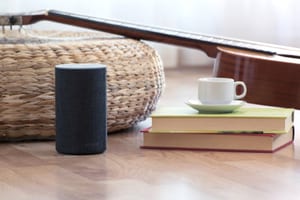
Hey Google, Can Police Access My Smartspeaker Voice Recordings?
It’s understandable to assume that if you’re alone in your home or outdoors with no one else around, calls made on your smartphone are totally private. In some cases, you would be wrong. Voice Assistant-powered smart speakers are listening in on your calls, as well as eavesdropping on your daily activities. For those who presume voice assistants like Alexa only switches on when you ask a question, a report by the advocacy group Consumer Watchdog suggests the point of listening in on and monitoring your smartphone activity may be to collect data to better sell you products in the future — in other words, building a profile of you that includes what you like and are likely to buy.
All of that private data being logged in your device has raised concerns that go well beyond advertising tools. Increasingly today, law enforcement agencies are eager to access that data as a means of solving crimes, finding suspects who are missing or to track someone’s movements. And that’s raised privacy concerns as well.
If you’re facing criminal charges and police want to gain access to your smartphone data, it’s best to consult with an experienced criminal defense attorney before you provide anything to law enforcement.
Can Police Access My Smartspeaker Voice Recordings?
It shouldn’t surprise anyone that everything we do on our smartphone, including voice recordings, become logged data. These devices may seem helpful when you need a quick answer to a random question, but this kind of sophisticated surveillance equipment is, in fact, a massive information collection device intended to help manufacturers find easier ways to market products to you based on your interests.
However, marketers are not the only ones interested in your data. Last year, police in Hallandale Beach, Florida wanted access to an Amazon Echo Dot as part of a criminal investigation after a man was arrested and charged with the murder of his girlfriend following an altercation in their bedroom. While the defense called the death a tragic accident, detectives thought the Amazon Echo Dot might have captured voice recordings during that altercation.
This isn’t the only time police have turned to Amazon Echos as a resource during a criminal investigation. There have been similar cases in Arkansas and New Hampshire — and in each instance, Amazon refused to turn over user data to law enforcement. Clearly, the question being raised here is what privacy people using smart speakers can expect.
Currently, police can only access that data if they can get a court order, which is similar to getting a search warrant for your home or car.
What Privacy Concerns Have Been Raised About Smartspeakers?
Beyond concerns about the manufacturer or whether police can gain access to your voice recordings, there’s also the question of safety — whether someone can illegally hack into your device to access your data for either identity theft or another crime.
All of these issues are raising genuine privacy concerns. In 2019, Florida’s Chief Financial Officer Jimmy Patronis warned Floridians about sharing medical information with their smart speakers. Because of the data collection in these devices, Patronis noted, customers needed to be wary about how secure their information actually is if they have Alexa in their homes.
While the clearest way to protect yourself from any privacy concerns is to not buy these devices, that’s not likely to become a solution in the future.
Robert J. Currie, a law professor at the Schulich School of Law at Dalhousie University and Director of the Law and Technology Institute, said there are also questions about whether voice recordings can become admissible as evidence in a trial because of questions about their reliability. He noted:
“We’re dealing with a new kind of technology here. The software is not always very good. And we’re not talking necessarily about Amazon or Google here, we’re talking about all kinds of tech companies who manufacture [products] that may record audio or video or data about you. The software may be defective, it is amenable to hacking, it may be amenable to misuse.”
As technology keeps becoming more advanced and more sophisticated on these devices, law enforcement is trying to catch up, and the issues around the use of this data remain complex.
Experienced Criminal Defense Attorneys On Your Side
If you’re facing criminal charges in Central Florida and are worried that police will try to gain access to any data on your smartphone, contact our experienced criminal defense attorneys today so we can review your case and ensure that your rights are fully protected during this investigation.
The Umansky Law Firm’s team of criminal defense lawyers use their experience as former Florida prosecutors to aggressively defend you throughout every step of the process. To schedule a free case review with one of our Florida criminal defense attorneys, complete an online contact form or call today.


